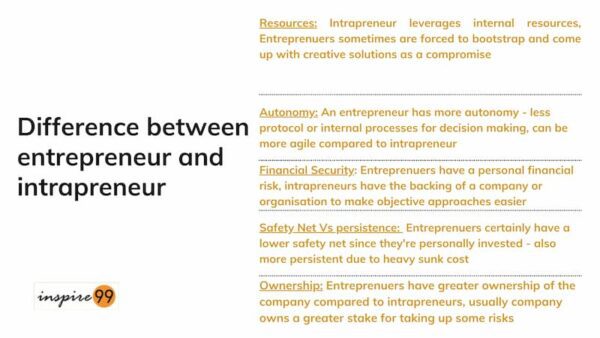Difference between entrepreneur and intrapreneur: They both sound similar but are fundamentally different considering the environment they work in. We all know that both entrepreneurs and intrapreneurs take risks. They both risk putting their idea in front, investing time and energy to create something new.
However, an entrepreneur operates independently while an intrapreneur is within a company environment. The intrapreneur garners support from the existing network, talent and infrastructure within a company. An entrepreneur however will need to do this all from scratch. On the flip side, the intrapreneur will work under the confines of a company making it less agile compared to an independent setup. In this article, we will talk more about the differences between an intrapreneur and an entrepreneur.
Difference between entrepreneur and intrapreneur
They both operate under similar conditions regarding risk, characteristics required to succeed, innovative spirit etc. However, fundamentally their differences can be captured in these key areas:

- Availability of resources for intrapreneurs and entrepreneurs
- Entrepreneurs autonomy Vs Intrapreneur’s dependence
- Level of risk and safety for Intrapreneur vs Entrepreneur
- Ownership and rewards
- Financial security
Availability of resources for intrapreneurs and entrepreneurs
Intrapreneurs have a marked advantage in the availability of resources. They will be able to leverage the talent pool within a company allowing them to innovate and develop solutions faster. Apart from this, they also have a captive audience and customers to take feedback from. Entrepreneurs on the other hand must rely on their social capital to reach out to customers and have conversations with them even for product discovery.
An entrepreneur will have more challenges reaching out, and establishing authority over the subject matter since they are relying on personal credibility. These things become easier in a company setup.
Entrepreneurs autonomy Vs Intrapreneur’s dependence
An entrepreneur has a wider autonomy, at least in the initial stages of the business. They can define the product vision, business ethics, logo – anything at all. They don’t have to worry about convincing anyone else to define these in the early stages. These would change if you would take up investment from different funding areas. However, even in that situation, you’ll have more autonomy since you hold the majority of shares within your company.
An intrapreneur however might hold only a small stake in that idea. They will have the opportunity to work on the idea and leverage the resources within the company. But, the autonomy with which they can make decisions will be limited since they’d need to get approval from senior leadership for most decisions.
Level of risk and safety for Intrapreneur vs Entrepreneur
The entrepreneur risks everything they have. This is almost fundamental to the definition of being an entrepreneur. We can map out the various types of risks taken by the entrepreneur and they bear the effects of it completely. Any level of safety or mitigation will have to be provided by themselves and in most cases, the opportunity cost of doing this would be severe.
For an intrapreneur, however, the risks would be under the banner of a company. It would still be treated as a job. So, even if you fail, the opportunity cost is minimal. it doesn’t discount the fact that both intrapreneur and entrepreneur would work hard on their idea. However, the cost of loss for an intrapreneur is much smaller compared to an entrepreneur.
Ownership and rewards
This is another area of a large difference between entrepreneur and intrapreneur. An entrepreneur owns everything in the business. This is true until there’s an external funding opportunity based on equity funding even after which you’d hold a major stake within the company. As a result of this, you’ll reap the rewards of success or failure fully.
As an intrapreneur, however, the company will own a major stake in your idea. The rewards you gain from success will be reduced since the company will take a share out of it. You’ll reap the benefits of the company’s investment, network etc but it will come at a cost.
In conclusion: Both entrepreneurs and intrapreneurs have a great contribution in creating something out of nothing. They both bring out the entrepreneurial spirit that allows value creation and contributes to the overall good of the economy. An intrapreneur’s contribution sometimes is akin to doing an additional job along with their full-time job.
Although they compromise on the stake or ownership in a company, they gain from the benefit of being within their overall umbrella. The journey for an entrepreneur is much tougher considering that they have to do this all by themselves. The cost of failure is higher and the opportunity cost of time can be much harsher. Our only advice is to leverage the benefits you have to give you the best results at the earliest timeline.

Pingback: 5 Key Areas of difference between entrepreneur and businessman - Inspire99